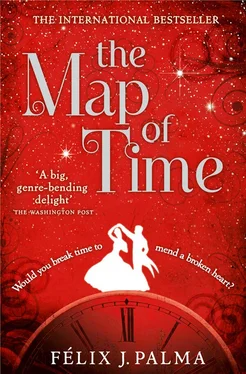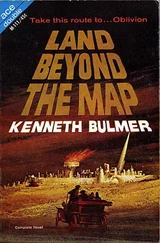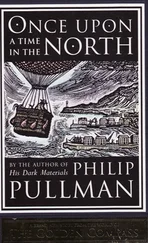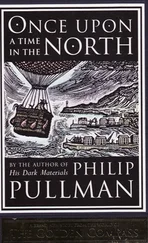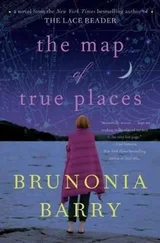Murray studied the two men for a moment before he replaced the box on the desk, where it sat, lid open, like an oyster or an engagement ring. Then he added, ‘But in the meantime, while science is looking for a way to make these dreams come true, we have another method of travelling in time, although unfortunately this one does not enable us to choose our destination.’
‘What method is that?’ Andrew enquired.
‘Magic,’ boomed Murray.
‘Magic?’ echoed Andrew, taken aback.
‘Yes, magic,’ repeated his host, waving his fingers in the air mysteriously and making a sound like wind whistling down a chimney, ‘but not the conjuring tricks you see in music halls or theatres, or the sort those frauds from the Golden Dawn claim to perform. I’m talking about genuine magic. Do you believe in magic, gentlemen?’
Andrew and Charles paused, a little confused by the direction the conversation was taking, but Murray needed no reply. ‘Of course not,’ he grumbled. ‘That’s why I avoid mentioning it. I prefer my clients to believe we are travelling through time by means of science. Everybody believes in science. It has become far more credible than magic. We live in modern times. But, I assure you, magic does exist.’
Then, to Andrew and Charles’s surprise, he rose deftly from his seat and gave a shrill whistle. The dog, which had been lying on the carpet all this time, stood up at once and trotted gaily over to its master. ‘Gentlemen, I’d like you to meet Eternal,’ he said, as the creature circled him excitedly. ‘Do you like dogs? It’s quite safe to stroke him.’
As though this were some sort of requirement they must fulfil for Gilliam Murray to continue his discourse, Charles and Andrew stood up and ran their hands over the soft, well-brushed coat of the golden retriever.
‘Gentlemen,’ Murray declared, ‘be aware that you are stroking a miracle. For, as I told you, there is such a thing as magic. It is even tangible. How old do you think Eternal is?’
Charles had no difficulty in answering the question: he had several dogs on his country estate and had grown up with them. He examined the animal’s teeth with a knowledgeable air, and replied confidently, ‘A year, two at the most.’
‘Spot on,’ confirmed Gilliam, kneeling and scratching the dog’s neck affectionately. ‘You look a year old, don’t you? That’s your age in real time?’
Andrew took this opportunity to catch his cousin’s eye, anxious to know what he thought of all this. Charles’s tranquil smile put his mind at rest.
‘As I said,’ Murray went on, rising to his feet, ‘I didn’t decide to set up my company on account of Wells’s novel. It was a complete coincidence, although I won’t deny I have greatly benefited from the hidden longing he stirred in people. Do you know why time travel is so attractive? Because we all dream of it. It is one of man’s oldest desires. But would you have considered it possible, gentlemen, before Wells wrote his book? I don’t think so. And I assure you neither would I. What Mr Wells has done is to make an abstract craving real, to articulate this latent desire ever-present in man.’
Murray paused, giving his summary the opportunity to descend on his visitors, like dust settling on furniture after a carpet has been beaten.
‘Before setting up this company, I worked with my father,’ he resumed. ‘We financed expeditions. We were one of the hundreds of societies sending explorers to the furthest corners of the world with the aim of gathering ethnographic and archaeological data to publish in scientific journals, or finding exotic insects or flowers for the showcases of some science museum eager to display God’s wildest creations. But, regardless of the business side of things, we were driven by a desire to get to know as accurately as possible the world we lived in. We were, to coin a phrase, spatially curious. However, we never know what fate has in store for us, do we, gentlemen?’
Again without waiting for a reply, Gilliam Murray gestured for them to follow him. Eternal at his heels, he led them through the obstacle course of tables and globes towards one of the side walls. Unlike the others, which were lined with shelves crammed with atlases, geographical treatises, books on astronomy and numerous other works on obscure subjects, this wall was covered with maps, arranged according to when the regions on them had been charted.
The collection covered a journey that started with a few reproductions of Renaissance maps inspired by Ptolemy’s works, which made the world look alarmingly small, like an insect with its legs chopped off, reduced to little more than a shapeless Europe. Next came the German Martin Waldseemüller’s map, where America had broken away from Asia, and finally the works of Abraham Ortelius and Gerhardus Mercator, which showed a much larger world, similar in size to that of the present day. Following this chronological order from left to right, as guided by Murray, the cousins felt as though they were watching the petals of a flower open or a cat stretch itself. The world seemed to unfurl before their eyes, to grow, as navigators and explorers extended its frontiers.
Andrew found it fascinating that only a few centuries earlier people had had no idea that the world went on across the Atlantic, or that its true size depended on the courage and fortunes of explorers, whose dare-devil journeys had filled the medieval void, the dwelling place of sea monsters. On the other hand, he regretted that the world’s dimensions were no longer a mystery, that the most recent maps of land and sea constituted an official world in which all that was left to chart were coastlines.
Murray made them pause in front of the last gigantic map in his collection. ‘Gentlemen, you have in front of you possibly the most accurate world map in all of England,’ he announced, openly gloating. ‘I keep it continually updated. Whenever another region of the planet is charted, I have a new version drawn up and I burn the obsolete one. I consider this a symbolic gesture, like erasing my old, imprecise idea. Many of the expeditions you see here were made possible by our funding.’
The map was a blurred mass of multicoloured lines that, Murray explained, represented all the expeditionary voyages hitherto undertaken by man, the vicissitudes of which he had written up, doubtless with morbid enjoyment, in the chart’s left-hand margin. However, one glance at the map was enough to see that the precision with which each sinuous voyage had been traced eventually became pointless: it was impossible to follow any single journey owing to the criss-cross of the lines that recorded every expedition. These ranged from the earliest, such as that of Marco Polo (represented by a gold line snaking around India, China, Central Asia and the Malayan archipelago), to the most recent, like that undertaken by Sir Francis Younghusband, who had travelled from Peking to Kashmir, crossing the Karakoram mountains with their soaring glacier-topped peaks.
The squiggles were not confined to land: others left terra firma, imitating the foamy wake of legendary ships such as Columbus’s caravels as they crossed the Atlantic Ocean, or the Erebus and the Terror as they tried to find a short-cut to China via the Arctic Ocean. These last two lines vanished suddenly, as had the actual ships when sailing across the Lancaster Strait, the so-called North-west Passage. Andrew decided to follow the blue line that cut across the island of Borneo, that sultry paradise overrun by crocodiles and gibbons to the south-east of Asia. It followed the tortuous journey of Sir James Brooke, nicknamed the Rajah of Sarawak, a name with which Andrew was familiar because the explorer popped up in Salgari’s novels as a ruthless pirate slayer.
Читать дальше
